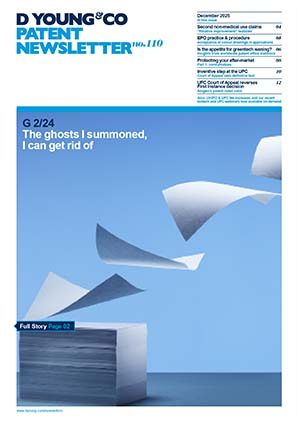Technologies for plastics waste management: patent trends & incentives supporting innovation
The European Patent Office (EPO) has recently published its analysis highlighting the innovation trends in tackling one of the most urgent environmental challenges: plastic waste. The report “Plastics in transition - Technologies for plastics waste management”, published in April 2025, draws on nearly five decades of patent filing data and tracks how technological progress is shaping the future of plastics recovery and recycling.
Patent trends in plastics management
Between 1975-2023, nearly 13,000 inventions were found in the fields of plastics waste management. Interestingly, the field has seen dramatic growth, with an eighteen-fold increase in patenting activity from 1990-2023 which is over four times faster than the average growth of all other technology areas. Growth has been particularly rapid since 2015 and reflects the increasing regulatory pressure, public concern, and industry demand for sustainable solutions.
The report looks at two sub-categories of plastic waste management: waste recovery and waste recycling. Waste recovery (which includes collecting, separating and preparation for further processing) accounts for around 32% of inventions. Waste recycling (which includes transforming recovered plastics into new materials using mechanical, chemical or biological processes) makes up the remaining 68% of inventions.
Historically, mechanical recycling dominated the field, involving the physical processing of plastics (such as melting and reshaping). However, more recently, there has been a notable rise in pyrolysis (thermal decomposition of materials in the absence of oxygen) and chemolysis (chemical decomposition of materials), methods that allow plastics to be converted into high-value feedstocks. Waste recovery technologies relating to selective dissolution and optical methods show consistently strong activity. There has also been a recent surge in technologies addressing persistent pollutants like microplastics, nanoplastics and per- and polyfluoroalkyl substances (PFAS). The report also identifies areas of future innovation potential. These areas show low but growing activity and include chemical and biological processes in waste recovery, and healthcare and cosmetics in waste recycling.
Regional trends demonstrate that Europe is a global leader in innovation against plastic waste, accounting for 44% of patent activity between 1990-2023. Germany, France, Italy, and the United Kingdom are among the top contributors.
However, since the 1990s, countries in Asia, notably Japan, the Republic of Korea and China, have significantly ramped up patenting activity. As a result, Asia is now level with North America, with each region contributing just under 30% of inventions globally.
The role of patent systems in supporting innovation
As the global plastics industry transitions from a linear to a circular economy model, these innovations are essential. But technology alone is not enough; regulatory incentives and supportive patent systems also play a role.
In the UK, one such mechanism is the Green Channel offered by the UK Intellectual Property Office (UKIPO). The scheme allows patent applicants to request accelerated processing for inventions that have an environmental benefit, including those relating to plastics waste management. There is no fee to use this service, and it can be used to fast-track patent search, examination, and/or publication. While early processing may bring forward costs that may otherwise be deferred, it can offer strategic advantages, such as early certainty on patentability or faster grant for commercialisation purposes.
Outlook
The EPO’s report underscores the importance of patents not just as legal tools, but as indicators of emerging technology trends. As pressure mounts to reduce plastic pollution, supportive patent systems and forward-thinking policies will remain vital in encouraging innovation and supporting the transition to a cleaner, more sustainable plastics economy.
Useful links
- EPO report, “Plastics in transition: technologies for plastics waste management” (PDF).
- UKIPO guidance, “Patents: accelerated processing”, including information about the Green Channel.


